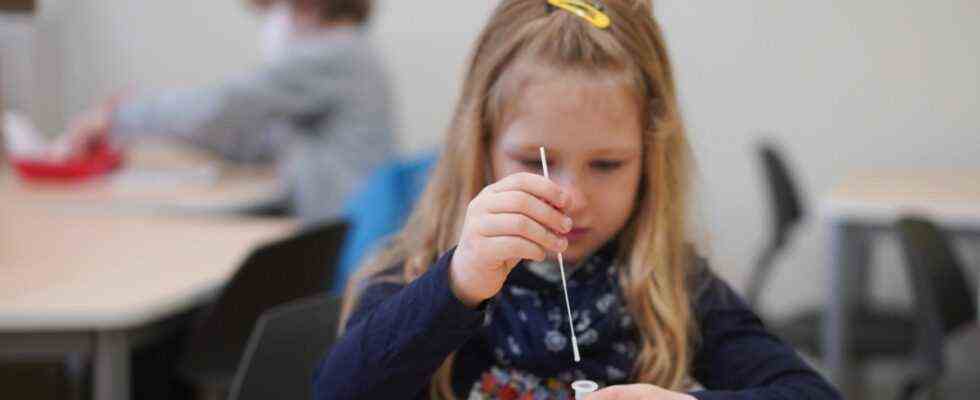Dozens of American pediatricians and pediatric infectiologists have it all rolled into one open letter warned of congestion in children’s hospitals in the United States. “Tragically, the rising number of Covid-19 infections in children, the increasing cases of respiratory diseases (…) and the ongoing effects of the pandemic on mental health are pushing our children’s clinics to their capacity limits,” it says. In connection with a considerable shortage of staff, the pediatric safety net is threatened in an unprecedented way, the authors write in a full-page ad that is also included in the New York Times and the Los Angeles Times has appeared.
According to data from the American Academy of Pediatrics The number of infections among children and adolescents in the USA rose from around 38,000 cases in the last week of July to just under 204,000 cases in the last week of August. However: In those states that transmit such data, it can be seen that only about one to three percent of all Covid patients treated in hospital are children. Since the outbreak of the pandemic, there have been barely more than 600,000 people who have died of Covid in the United States 361 children and young people. But even if children are significantly less likely to get seriously ill, many parents and experts worry about possible long-term damage from an infection with Sars-CoV-2.
Some doctors fear a wave of other respiratory diseases at the same time
The statement appears at a time when the question of how children under the age of twelve, who are not yet allowed to be vaccinated, can safely go to school and kindergarten is becoming more and more important in many countries. As in Germany, the current vaccination quota in the USA is not sufficient to keep the virus in check across the board and to protect unvaccinated people. In addition, another wave of infections could soon become noticeable. Infectiologists warn of a flood of other serious respiratory infections in children, caused for example by the influenza or human respiratory syncytial virus (RSV). Some children do not have colds and fever after these infections; they have to be hospitalized with pneumonia. After the lockdown and closings of numerous care facilities, several cohorts could come into contact with RSV or influenza for the first time this winter.
In media reports from the USA and Great Britain The first children’s clinics are already expressing concerns about the increasing number of patients with RSV and other respiratory infections. However, no valid data are yet available. The same applies to Germany. In any case, the situation in the USA cannot be directly transferred to Germany.
But in Germany too, the debate about how to deal with children and Corona in the course of the election campaign and the start of school is picking up speed again. The first parents to organize so-called off-label vaccinations for children under twelve years of age are organizing themselves in social networks. This would mean that doctors would still administer the vaccine in certain cases despite the lack of approval. The legal position on this is tricky. Many paediatricians reject such a vaccination, at least for healthy children, with reference to incomplete data. The pharmaceutical companies Pfizer and Biontech are currently testing the effectiveness and tolerability of their Covid vaccine for children under twelve years of age. Experts expect approval for the winter.
Schools are starting again now – so what should be done? “You have to somehow manage to run a school that does not lead to an exponential increase in infection activity in this unprotected age group,” said Charité virologist Christian Drosten im Deutschlandfunk. For children who are particularly at risk, such as the chronically ill, one must therefore help oneself “with an off-label application” until they are approved, in order to protect them from infection. Now the specialist societies of paediatricians are called upon to “make recommendations for dealing with this situation,” said Drosten. At the same time, he warned against not taking protective measures for children as long as possible complications and long-term consequences from an infection with Sars-CoV-2 have not been clearly clarified.
All reports on the current situation in Germany and worldwide as well as the most important news of the day – twice a day with SZ Espresso. Our Newsletter brings you up to date in the morning and in the evening. Free registration: sz.de/espresso. In our News app (download here) you can also subscribe to the espresso or breaking news as a push message.
A team of paediatricians, infectiologists and virologists argue in one current guest post in the Timethat it is no longer proportionate to prevent any infection among children if possible. Rather, it is now a matter of working more purposefully than before with close-knit tests, quarantine and contact tracking.
Another group of paediatricians, virologists and epidemiologists – including some who are viewed critically in the professional world due to non-scientific expressions of opinion – have meanwhile turned on an open letter “to the candidates for chancellor, ministers of education and families”. From their point of view there should be “equality for all children and young people with vaccinated and convalescent adults”. It is necessary to end “ineffective, in the mass extremely cost-intensive and stressful tests in asymptomatic children without a specific reason”. According to the authors, children and adolescents should no longer be quarantined at home after contact with an infected person. However, the team does not answer how children can specifically protect themselves from infection.
Despite the differences, American and German experts agree: adults protect children under the age of twelve with a vaccination. Wherever chains of infection are broken by vaccination, children have a good chance of getting through autumn without illness.

